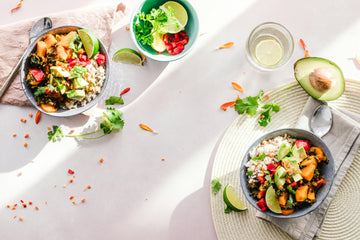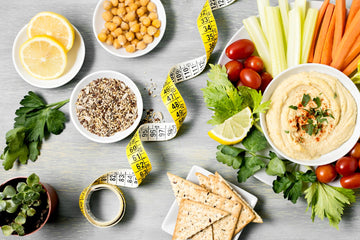Vegan protein sources – plant-based, strong and healthy
Proteins are an essential building block of our body and are indispensable for building muscle, tissue, and cells. However, many people wonder whether a vegan diet can even provide enough protein. The good news: There are numerous vegan protein sources that are not only high-quality but also delicious. In this article, you'll learn which plant-based foods are particularly rich in protein and how to optimally incorporate them into your diet.
Why are proteins so important?
Proteins fulfill numerous important functions in the body. They are essential building blocks for muscles, skin, hair, nails, and organs. Proteins also play a key role in cell repair and regeneration, especially after physical activity or injury. They also support our immune system by producing antibodies and other immune cells that protect us from infections.
Proteins are also essential for the production of hormones, enzymes, and neurotransmitters that influence our well-being, mood, and mental performance. Adequate protein consumption also helps maintain stable blood sugar levels, reduces cravings, and supports healthy weight management.
Especially in a vegan diet, it is important to keep an eye on protein intake, as plant sources often vary in their amino acid composition and should be carefully combined to ensure all necessary amino acids are included.
The best vegan protein sources
Pulses: Lentils, beans, and chickpeas contain up to 20 grams of protein per 100 grams and are versatile. They also provide fiber, iron, and B vitamins, which are especially important for vegans. They're excellent in soups, salads, stews, or as a base for burgers and plant-based patties.
Tofu and tempeh: Tofu provides about 15 grams of protein per 100 grams, while tempeh can reach up to 20 grams. Tofu is flavorless and can be marinated and seasoned excellently. Tempeh offers a fermented, easily digestible, and probiotic alternative with a nutty flavor. Both are ideal for frying, grilling, or in curries and vegetable stir-fries.
Seitan: With up to 25 grams of protein per 100 grams, seitan, made from wheat protein (gluten), is one of the most protein-rich vegan options. It has a meat-like texture and is excellent for marinating, grilling, frying, or using in vegan sausages and cold cuts.
Quinoa: This pseudocereal offers about 14 grams of protein per 100 grams and also contains all essential amino acids, making it an ideal vegan protein source. It's excellent as a base for salads, bowls, or as a filling side dish.
Nuts and seeds: Almonds, cashews, hemp seeds, and pumpkin seeds provide between 15 and 30 grams of protein per 100 grams. They are also rich in healthy fats, vitamins, and minerals such as magnesium, zinc, and vitamin E. They are perfect as a topping on salads, muesli, or as a snack between meals.
Tips for optimal absorption of vegan protein
Combination of different sources
Combine different plant protein sources to optimize the amino acid profile, for example, pulses with grains.
Protein-rich snacks
Reach for nuts, seeds, or plant-based protein shakes to meet your protein needs. Especially with a completely vegan diet, it's often difficult to meet your protein needs with purely plant-based foods. This makes snacks all the more important.
Balanced meals
Make sure to include a good source of protein in every meal to ensure you get enough throughout the day.
What should you look for in vegan protein sources?
When choosing vegan protein sources, there are several important factors to consider to ensure a balanced diet. Plant proteins often don't contain all essential amino acids in optimal ratios, which is why combining different foods is a good idea. For example, legumes, which are rich in the amino acid lysine, complement grains, which in turn contain a lot of methionine. This way, your body receives all the necessary amino acids that it cannot produce itself. Alternatively, amino acids can also be taken as supplements, such as our MTM amino acids.
Also pay attention to the quality of your protein sources: Prefer whole, unprocessed foods, if possible, as these provide additional vitamins, minerals, and fiber. Processed protein products should only be used as a supplement and should not make up the majority of your protein intake.
Another tip: Check your protein intake regularly, especially if you're physically active or looking to build muscle mass. Adequate protein intake supports physical performance, recovery, and long-term health.
Conclusion
A vegan diet can easily provide sufficient protein if you choose high-quality vegan protein sources. Variety and conscious combination are key. Enjoy your plant-based protein sources and benefit from their positive effects on your health and well-being. By ensuring a balanced diet with a variety of plant-based foods, your body receives all the essential nutrients it needs to function optimally. This not only strengthens your muscles and immune system, but also promotes your overall health and vitality. A well-planned vegan diet supports your long-term health goals sustainably and effectively.
Sources:
- Mariotti, F., & Gardner, C.D. (2019).
Dietary Protein and Amino Acids in Vegetarian Diets—A Review.
Nutrients, 11 (11), 2661. https://doi.org/10.3390/nu11112661 - Messina, M. (2014).
Nutritional and health benefits of dried beans.
The American Journal of Clinical Nutrition, 100 (1), 437S-442S. https://doi.org/10.3945/ajcn.113.071472 - van Vliet, S., Burd, NA, & van Loon, LJC (2015). The skeletal muscle anabolic response to plant- versus animal-based protein consumption. The Journal of Nutrition, 145 (9), 1981-1991. https://doi.org/10.3945/jn.114.204305




